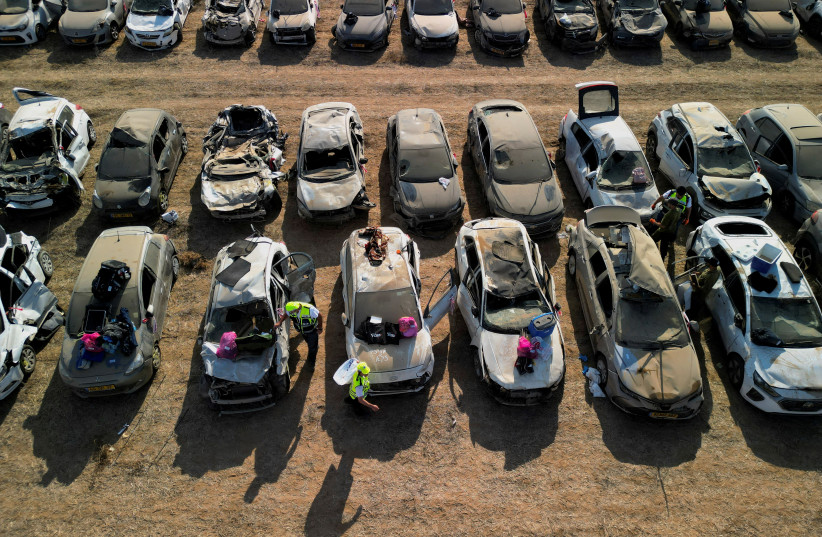Due to the lack of body parts or remains of many of those killed in the October 7 Hamas massacre, the ZAKA has recommended burying the cars of those who were killed in them.
ZAKA Tel Aviv is the emergency response unit of central Israel, serving in over 21 cities across the country with thousands of volunteers, and is recognized as a civil extension of Israel’s emergency services and the only emergency response unit authorized to operate in central Israel. One of the organization’s units is dedicated to ensuring “dignity in death,” particularly in situations of sudden or unexpected loss.
N12 reported on Tuesday that the organization, after intense and distressing efforts, concluded that they could not locate or clean all the remains of the victims inside the vehicles in which they were slaughtered.

Vehicles to be buried for first time in Israel's history
Some of the cars have blood stains or ashes that are difficult to collect for various technical reasons that have to do with the way these individuals were killed.
In order to preserve the sanctity of the deceased they decided to bury the vehicles. According to the report, “After consulting with the Military Rabbinate and the Chief Rabbinate, hundreds of vehicles will be buried in the coming few days in Jewish cemeteries across Israel.”
The Chief Rabbinate as well as the Religious Services Ministry have yet to officially respond to this report.
Israel Hasid, a spokesperson for ZAKA-Tel Aviv, addressed the pressing issue with The Jerusalem Post on Tuesday. He explained that Rabbi Yaakov Roza, the rabbinic authority of ZAKA, and the most highly esteemed halachic figure in Israel concerning proper burial, “raised a critical question regarding the disposal of vehicles after they have undergone cleaning,” after the massacre, where hundreds were killed or were burned alive in vehicles.
"These are vehicles that have become contaminated with ashes or blood, making it impossible to completely cleanse them."
Israel Hasid, spokesperson for ZAKA Tel Aviv
“These are vehicles that have become contaminated with ashes or blood, making it impossible to completely cleanse them. Rabbi Roza proposed the idea of burying several hundred such vehicles, those that cannot be fully cleaned, in designated burial sites.”
Hasid emphasized that the final decision on this matter must be sanctioned by either the Chief Rabbinate or the Religious Services Ministry and that the decision is expected to be reached and publicly announced in the coming days.
The process of burial will involve placing these vehicles in designated burial pits, “akin to how significant findings are treated in major tragedies,” Hasid explained.
According to Halacha (Jewish law), ashes or blood remains are holy and need to be buried, yet they aren’t necessarily buried in a cemetery with the deceased, but in a designated burial pit. “Importantly, there won’t be any headstones above these plots, and they won’t be buried in a cemetery,” Hasid explained, adding that he assumed the state would build some sort of monument above these plots.
In order to save space and be as environment-friendly as possible, Hasid explained that the cars may be shredded before being buried. “The underlying rationale behind this initiative is to maximize space efficiency by compacting the existing vehicles.”
Hasid added, “It is believed that creating a unique memorial in this manner will provide solace to some grieving families who are uncertain about the whereabouts of their loved ones. The families are highly supportive of this initiative, understanding that it may include the ashes or blood of their dear ones who will find a final resting place in this manner.”
